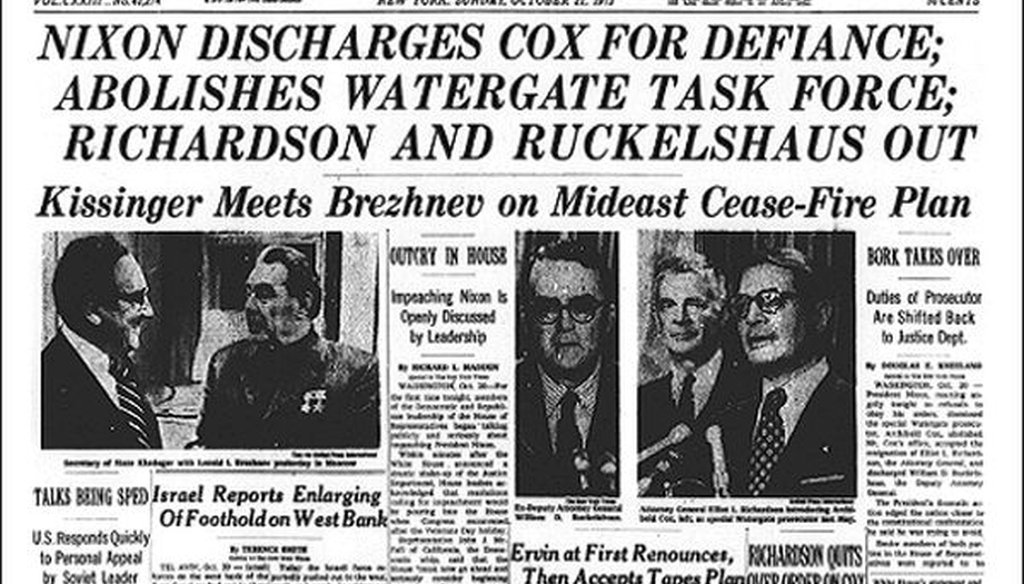Stand up for the facts!
Our only agenda is to publish the truth so you can be an informed participant in democracy.
We need your help.
I would like to contribute

The front page of the New York Times reporting the Saturday Night Massacre.
For many political observers, President Donald Trump’s sudden firing of FBI Director James Comey immediately called to mind President Richard Nixon’s Saturday Night Massacre. That night back in 1973, Nixon fired Watergate special prosecutor Archibald Cox, even as his top two Justice Department officials resigned in protest rather than carry out Nixon’s order.
That pivotal episode of the Watergate scandal stemmed from testimony by former White House aide Alexander Butterfield, who said that Nixon had secretly recorded White House conversations. Nixon battled subpoenas from a Senate subcommittee and from Cox to hear the tapes; after several rounds of appeals, the White House was ordered to turn them over. Nixon offered to hand over summaries, but Cox rejected the proposal.
On Oct. 20, 1973, Nixon ordered Cox’s firing, but his attorney general and deputy attorney general, Elliot Richardson and William Ruckelshaus, refused to do it. The solicitor general, Robert Bork, followed Nixon’s order and fired Cox.
Comey, meanwhile, was fired as he was overseeing an investigation into possible connections between Trump’s campaign and Russian efforts to disrupt the 2016 election. On the surface, many experts saw similarities.
"It really does have the smell of Watergate," presidential historian Robert Dallek told the Daily Beast. "It just raises suspicion this is a Nixonian president trying to cut off this investigation, or at least delay it."
And Princeton University historian Kevin Kruse wrote in Esquire that the comparisons are "warranted. Just like Nixon, Trump fired the federal official who has been leading an inquiry into his administration's alleged misdeeds. And, just like Nixon, he did so precisely as that inquiry seemed to be closing in on him. The investigated fired the investigator, and all hell is breaking loose."
Still, the two episodes have important differences as well.
No less an expert than Bob Woodward -- one of the two Washington Post journalists who broke the Watergate scandal -- said on MSNBC’s Morning Joe that while "indeed there are comparisons," the "circumstances, in fairness, are also quite different."
Let’s take a look at some of the similarities and differences between the Saturday Night Massacre and the Comey firing.
Some similarities
• Investigators who could have threatened the president were fired
This is the most obvious one. Both episodes "involved firings of individuals who were investigating the president and those in leadership positions in the President’s campaign and administration," said Erwin Chemerinsky, dean of the law school at the University of California-Irvine.
Ray Locker, author of Nixon's Gamble: How a President’s Own Secret Government Destroyed His Administration, agreed.
Comey "may have told Trump he was not investigating him per se, but investigations go where the evidence takes them, and it’s quite possible it could have found its way to Trump," Locker said. "Richard Nixon was not the specific focus of Watergate special prosecutor Archibald Cox’s investigation, but the probe was taking Cox there, especially as he fought for access to the White House tapes."
• The allegations at issue involved elections
"In both cases, there were allegations—unproven, but backed by circumstantial evidence—that the president or his aides illegally interfered with the democratic process during the previous year’s presidential election," said presidential historian David Greenberg of Rutgers University. "For Nixon, the interference took the form of breaking into and wiretapping the Democrats’ offices. For Trump, the interference took the form of stealing and publishing the Democrats’ emails. In both cases, there were also suspicions of a cover-up."
• The firings themselves were handled messily
In Nixon’s case, the desire to fire Cox led to the resignations of two senior administration officials tasked with that duty. In Trump’s case, he fired Comey via a letter hand delivered to the FBI on a day when the FBI director was in California; he reportedly learned the news only after the news had broken.
"Both were handled in a ‘ham-fisted’ way, making it look all the worse," said James D. Robenalt, a Cleveland-based lawyer who runs a continuing legal education class on Watergate and its lessons.
Some differences
While there are some strong similarities, there are also significant differences between the two firings.
• The Watergate investigation was much further along
As Woodward noted on Morning Joe, by the time Cox was fired, "there had been four days of public testimony" by Dean -- "devastating testimony saying that Nixon was leading the cover-up." Nothing so damning about Trump and Russia has emerged, experts said.
• Comey’s firing won’t necessarily shut down the FBI investigation
The firing of Cox was a real dagger at the heart of the special prosecutor’s investigation; it was only under intense political pressure that Nixon relented and tapped a new special prosecutor, Leon Jaworski.
By contrast, the FBI is an ongoing federal agency staffed mostly by career government officials. If the new FBI leadership doesn’t put the kibosh on the investigation -- admittedly an important caveat -- then the infrastructure exists to continue the investigation after Comey’s departure.
• The stances taken by top Justice Department officials are reversed
"Nixon fired Cox after his attorney general and deputy attorney general had refused to fire Cox," said Ronald Rotunda, a law professor at Chapman University who was an investigator during Watergate and later an advisor to special prosecutor Kenneth Starr during the Clinton administration. "Trump fired Comey when deputy attorney general (Rod Rosenstein) -- a career civil servant who had been appointed by both Obama and Trump -- recommended firing Comey, and his attorney general agreed."
• Comey, unlike Cox, had a controversial record
Comey came under fire -- initially more so among Democrats -- for his decision to hold a press conference harshly criticizing the actions of presidential candidate Hillary Clinton, even as he said she was not going to be prosecuted. Later, just days before the election, Comey announced that he was reopening the investigation due to newly discovered evidence -- a move that contradicted longstanding protocols about not making such statements soon before an election.
• Trump’s action had more legal authority
While firing the FBI director in the middle of their 10-year term is rare -- and politically risky -- it was within Trump’s rights to do it.
By contrast, Robenalt said, Nixon’s firing of Cox was arguably a case of the executive branch firing an official of the judicial branch, since he was working on behalf of a grand jury. As a result, he said, the Nixon situation was a genuine "constitutional crisis," while the Trump decision is not.
• Nixon faced a Congress from the opposite party; Trump doesn’t
"When Nixon had Cox fired, Congress reacted almost immediately with calls for impeachment," Locker said. "That’s unlikely to happen now with a Republican-controlled Congress. There seems to be no calls for impeachment from anyone in a position to make it happen."
• Trump is presiding over a more polarized country
There are fewer committed moderates today who are apt to break with their party, experts said.
"There is far more cynicism now," John A. Farrell, the author of Richard Nixon: The Life, told Slate.com. "Nixon had to craft his lies in a way that Americans would believe it. Trump just says whatever he believes his base will find somewhat logical or believable or can hang their hat on. Everyone treats the system with incredible cynicism."
UPDATE, May 15, 2017: We have updated this article to reflect changing accounts by the White House and other figures.
First, we have removed one sub-heading from the "differences" section -- that "there’s less certainty about Trump’s motivations than Nixon’s."
At the time the story was written, the White House was arguing that President Donald Trump was simply following the recommendation of his deputy attorney general, Rod Rosenstein. Subsequently, however, Trump told NBC’s Lester Holt on May 11 that, "I was going to fire regardless of recommendation. ...And in fact, when I decided to just do it, I said to myself -- I said, you know, this Russia thing with Trump and Russia is a made-up story. It's an excuse by the Democrats for having lost an election that they should've won."
Second, we have removed a reference, offered by one of our experts, that "Comey had lost the good faith of FBI career agents and many other people." While it is hard to know whether or not that’s the case, the acting FBI director, Andrew McCabe, testified forcefully against that notion in an appearance before the Senate Intelligence Committee on May 11.
"Director Comey enjoyed broad support within the FBI and still does until this day," McCabe testified. "We are a large organization -- we are 36,500 people across this country, across this globe. We have a diversity of opinions about many things. But I can confidently tell you that the majority -- the vast majority -- of FBI employees enjoyed a deep and positive connection to Director Comey."
Our Sources
New York Times, "In Trump's Firing of James Comey, Echoes of Watergate," May 9, 2017
CNN, "Comey firing draws comparisons to Nixon's 'Saturday Night Massacre,' " May 9, 2017
PBS Newshour, interview with John Dean, May 9, 2017
USA Today, "Donald Trump, Richard Nixon and Watergate: What's the same and what's different?" May 10, 2017
Slate.com, "Is This Donald Trump’s Saturday Night Massacre?" May 10, 2017
Esquire, "Trump's Tuesday Night Massacre Brings the Watergate Comparisons Full Circle," May 10, 2017
Daily Beast, "'Smell of Watergate' Hits Trump's White House," May 10, 2017
Newsmax, "Bob Woodward: In Comey Firing, Some Comparisons to Watergate," May 10, 2017
Email interview with Erwin Chemerinsky, dean of the law school at the University of California-Irvine, May 10, 2017
Email interview with Ray Locker, author of Nixon's Gamble: How a President’s Own Secret Government Destroyed His Administration, May 10, 2017
Email interview with David Greenberg, Rutgers University historian, May 10, 2017
Email interview with James D. Robenalt, attorney and creator of a continuing legal education class on Watergate and its lessons, May 10, 2017
Email interview with Ronald Rotunda, a law professor at Chapman University, May 10, 2017




































